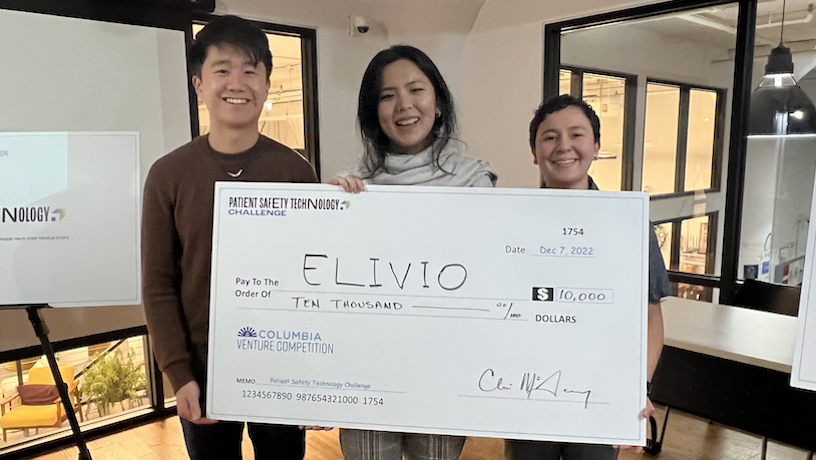Columbia Engineers Aim to Revolutionize Post-Surgical Care
Three Columbia Engineering students and alumni, founders of the postoperative care startup Elivio, say innovative early detection technology can save millions for hospitals and reduce surgical site infections.

It was 3 a.m. in Bogota, Colombia. Sam Botros' aunt was in the hospital with unbearable pain at the incision site of the surgery she’d had a couple of weeks earlier. Botros – then in medical school – realized she’d seen the same problem many times during her clinical rounds: her aunt was suffering from a surgical site infection.
Today, Botros is a biomedical engineering master’s student at Columbia Engineering working on a medical device that detects early-onset surgical site infections (SSIs). The device would use sensors to keep track of the incision’s temperature and other critical factors – basic forms of monitoring that could have prevented Sam's aunt from suffering and could one day help hundreds of thousands of people a year in just the U.S.
“It started as a school project," says Botros, "but then it grew over time." As she was brainstorming ideas for an innovation project in a Biomedical Innovation course taught by adjunct professors Chirag Sachar and Krista Durney, Botros remembered how, a few years earlier, she helped save her aunt's life.
To build the device, Botros founded Elivio – a recent finalist at Columbia Engineering’s Fast Pitch competition – together with Albert Go MS '22, and Wendy Shi MS '23.
Catching it early
Surgical site infections sometimes develop after a patient is discharged from surgery. "If a patient develops a surgical site infection, their chance of death increases from 2 to 11 fold," says Go.
According to data gathered by the Elivio team, out of roughly 50 million surgeries per year, around 2 million lead to patients developing a surgical site infection, and a further 400,000 of those 2 million are readmitted to the hospital due to complications. The overall cost of the extra medical care associated with treating these infections is roughly $8.2 billion per year.
"Once [a patient] is discharged, they are left to their own devices," says Albert Go, who graduated from MIT and worked at Boeing before coming to Columbia intending to specialize in robotics. Although patients are told what major warning signs to look for, they are "pretty much on their own” until their next standard post-op checkup, several weeks later – leaving plenty of time for an infection to develop.
The idea behind Elivio is to reduce this economic and emotional burden inflicted on patients. “If you catch it early enough, the infection can be treated with just antibiotics and it will save a lot of time, a lot of money, and a lot of pain,” Go says. “We are trying to bridge the gap between the recovery and the hospital and give those patients a sense of security.”
Based on medical research and interviews conducted with doctors and nurses, the Elivio team is developing a wearable device made of three sensors that will detect the temperature along the incision site, as well as other potential indicators of an infection. The device would then report back into an app, where the patient could also fill in more information, take pictures and share any other symptoms. This data would be collected into a machine-learning algorithm that determines the likelihood of infection and alerts the user and their caregiver in real time.
One of the challenges the team faces is how to make the device both functional and convenient to wear for the patients. "[The Elivio] is worn continuously, and that's why we are trying to develop it as small as possible," says Go. "Each sensor is about the size of a quarter. We're still working on it, but we believe we can get it down smaller."
Ready for the ride
In a short period of time, the Elivio team has managed to win several pitch competitions and has raised over $20,000 through grants and prizes. Now, they are excited about the next step: testing their newly-developed prototype.
"Right now, we're working toward the most difficult part: to acquire that lab space and have the opportunity to do the testing," says Botros. "If the data is promising, I think that will really open the doors for us."
"Assuming the initial test goes well,” Go adds, “which I am confident it will, I think the money will really start flowing in and we can start really making a big impact in the healthcare industry.”
The team is excited to make its mark on the medical field. But in the healthcare industry, implementing such technology could take years.
"There are clinical trials, FDA validation, and a lot more hurdles to jump through," says Go. "So it could be ten years down the road where we're finally starting to be a company. It will take some time, and we're ready for that journey."
Ultimately, Wendy Shi says, "The dream is definitely to be able to make something that will help patients with their recovery process and make this much easier for them, make the whole process much less burdensome.”
What is Fast Pitch?
Fast Pitch is an annual competition at Columbia where teams of undergraduates, graduates, or alumni present their business ideas in 60 seconds or less to a panel of experienced entrepreneurs and business leaders. Throughout the competition, participants receive feedback from judges and mentors who help them refine their ideas and presentation skills. The finalists go on to present their pitches in front of a live audience, including potential investors and industry professionals, and the top few pitches win cash prizes out of a $5,000 pool.
